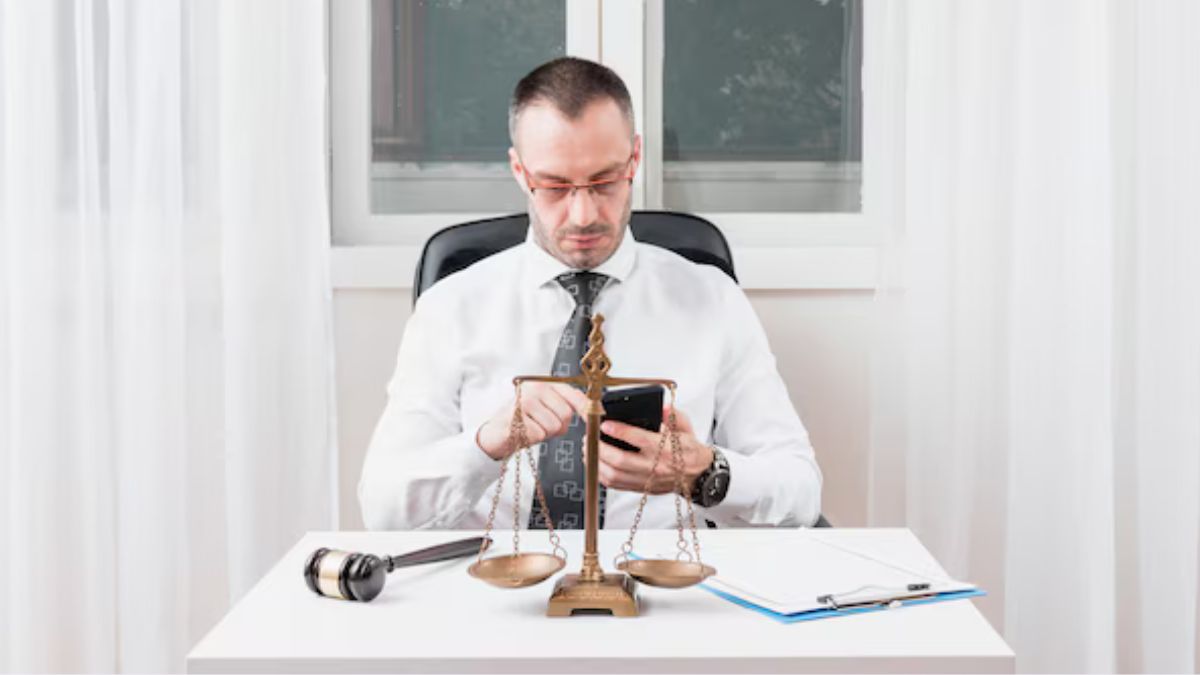LAW
AITA: Understanding the Complexities of Online Judgement

Navigating social interactions can be tricky. One misstep, and you might find yourself questioning your own actions and motives. That’s where the AITA subreddit comes into play. The acronym stands for “Am I the Asshole?”—a space dedicated to sharing personal dilemmas and seeking judgment from a vast online community.
With thousands of posts flooding in daily, users grapple with moral quandaries ranging from trivial disagreements to life-altering decisions. This platform thrives on anonymity, allowing people to share their stories without fear of real-world repercussions. But with great power comes great responsibility, especially when it involves the opinions of strangers who may not fully understand your situation.
In this blog post, we will delve deeper into the intricacies surrounding AITA—a fascinating blend of human psychology, social dynamics, and ethical considerations that shape our understanding of right and wrong in an increasingly complex world. Whether you’re a frequent poster or just curious about this phenomenon, there’s much to unpack here!
The Power of Anonymity in Online Judgement
Anonymity can be a double-edged sword in the world of online judgment. On one hand, it provides users with the freedom to express their thoughts without fear of real-world repercussions. This liberation encourages open conversations about delicate topics.
But anonymity also breeds recklessness. People may say things they wouldn’t dare utter face-to-face. The shield of invisibility can lead to toxic behavior and harsh judgments that might not reflect genuine opinions.
In environments like AITA, this dynamic is particularly intense. Users often feel empowered to voice strong opinions while hiding behind usernames. It creates an atmosphere where empathy sometimes takes a backseat.
This unique aspect of online interaction has profound implications for those seeking advice or validation. Being anonymous allows for honesty but can warp perspectives on what constitutes appropriate feedback or support from others in the digital community.
The Role of Groupthink and Social Validation
Groupthink thrives in online spaces like AITA. When a post gains traction, it can create an echo chamber of opinions. This often leads to consensus that may overlook nuances.
Social validation plays a crucial role here. Users seek affirmation from others who share similar views. The desire for acceptance can cloud judgment and skew the feedback received.
Contributors frequently find themselves caught in a cycle of agreement. Dissenting voices are often drowned out, making it hard to see differing perspectives.
This dynamic can lead to oversimplified conclusions about complex situations. It’s important to recognize how groupthink influences responses on platforms dedicated to judgement and advice.
The pressure to conform complicates genuine dialogue, leaving some users feeling isolated when their experiences don’t align with popular opinion.
Negative Effects on Mental Health and Well-being
The AITA subreddit can be a double-edged sword. While it offers a platform for seeking advice, the responses often come with harsh judgments. This can lead to feelings of inadequacy and confusion.
Many users find themselves emotionally affected by the comments they receive. Reading through threads filled with criticism may amplify insecurities and self-doubt. It’s easy to forget that online opinions do not define one’s worth.
Moreover, anonymity encourages people to express extreme views without accountability. The barrage of negative feedback can feel overwhelming, leading some individuals into a spiral of anxiety or depression.
Social media’s fast pace adds another layer of pressure. Users might refresh their posts repeatedly, hoping for validation but only receiving more negativity instead. This cycle can become exhausting and detrimental to one’s mental health over time.
Steps to Take Before Posting on AITA
Before hitting that submit button on AITA, take a moment to reflect. Ask yourself if your situation is truly complex or just a minor annoyance blown out of proportion.
Try writing down the main points you want to share. This helps clarify your thoughts and ensures you don’t miss important details.
Consider how you might feel after receiving judgment from strangers. Some responses can sting, even if they come with good intentions.
It’s also wise to think about potential biases in your story. Are there any parts you’re leaving out? Honest reflection can lead to more balanced feedback.
Consider seeking advice from trusted friends or family first. They know you well and may offer valuable perspectives before turning to an online forum for validation.
Alternatives to Seeking Validation on AITA
Instead of turning to the AITA subreddit for validation, consider talking directly with trusted friends or family. They can offer personal insights and a supportive ear without the anonymity that often skews online judgment.
Journaling is another effective alternative. Writing down your thoughts helps clarify feelings and decisions. It allows you to reflect on situations without external influence, fostering self-awareness.
Professional guidance from therapists or counselors can also be invaluable. They provide a safe space to explore your dilemmas while equipping you with tools for better decision-making.
Engaging in support groups focused on specific issues might bring comfort too. These communities allow sharing experiences in a more structured environment, promoting understanding over harsh judgment.
Seeking information through reliable resources instead of social platforms can empower you with knowledge rather than the opinions of strangers online.
Conclusion: Finding Balance Between Seeking Advice and Accepting Criticism
Navigating the world of AITA can be both enlightening and overwhelming. The anonymity provided by the subreddit allows individuals to share their dilemmas without fear of personal repercussions. This freedom, however, often leads to a bandwagon effect where opinions can amplify rather than clarify.
It’s essential to recognize that while groupthink may offer immediate validation, it doesn’t always lead to constructive feedback. Many users find comfort in numbers but might ignore nuanced perspectives that could help them grow.
The impact on mental health cannot be overlooked either. Relying heavily on online judgment can create an unhealthy cycle of seeking approval from strangers instead of fostering self-awareness and resilience.
Before posting on AITA, consider your motivations. Are you looking for genuine advice or simply affirmation? Taking a moment to reflect can make all the difference in how you digest responses.
Exploring alternatives like talking with trusted friends or professionals might provide richer insights into your situation. Real-life conversations foster deeper understanding and emotional support that Reddit threads may lack.
Finding balance is crucial when navigating these digital waters. It’s important to seek guidance while also being open to accepting criticism gracefully. This duality will empower you as you face life’s challenges head-on—armed not just with opinions but wisdom gained through thoughtful reflection and dialogue.
LAW
What to Know About Arrests.org and Accessing Arrest Records

Arrests.org is one of the largest open databases for accessing arrest records across the United States. Whether you are researching local crime trends, conducting background checks, or simply curious, the platform offers a comprehensive collection of records from county jails across multiple states. But what exactly is Arrests.org, how does it operate, and what should you know before using it? This blog will answer these questions and more, offering insights into the platform’s features, potential uses, and important ethical considerations.
What is Arrests.org?
Arrests.org is an online open database that allows users to browse, search, and view arrest records. It compiles information from various county jail systems across the United States, providing an accessible way to look up records for current and former inmates.
The website covers a broad range of states, including Alabama, California, Florida, New York, and Texas, among others. With its straightforward layout, users can quickly find arrest information by state or search for specific individuals using names or other identifying details.
Why Do People Use Arrests.org?
Arrests.org serves a variety of purposes for different users. Below are some of the most common reasons why individuals and organizations turn to the platform:
1. Background Checks
Employers, landlords, and even private citizens frequently use Arrests.org to find arrest records during background checks. Knowing someone’s arrest history can provide insights into potential risks when making hiring, renting, or personal decisions.
2. Public Safety Awareness
Local residents may want to understand crime trends in their area. Using platforms like Arrests.org, individuals can browse recent arrests within their communities and get a sense of prevalent offenses.
3. Research
Arrests.org can be a valuable resource for journalists, researchers, or academics who are investigating crime data and trends across various states. Its extensive database aggregates information that can support data-driven insights.
4. Personal Curiosity
Sometimes, users are simply curious about whether a friend, acquaintance, or neighbor has been arrested. While this can feel invasive, the open database ensures that arrest information is publicly available, which is legal under U.S. laws.
Features of Arrests.org
Arrests.org is designed with simplicity and functionality in mind. Here’s a closer look at some of its key features:
1. State-by-State Directory
The website organizes arrest data by state, making it easy to narrow your search geographically. Each state has an individual landing page where users can browse or search for specific records.
2. Search Function
Users can search for individuals using identifying information, such as full name. The search function, combined with the site’s organized structure, allows for quick record retrieval.
3. Broad Geographic Coverage
Arrests.org covers a wide range of states, offering arrest data from across the country, including Alabama, Florida, Texas, New York, and more (a complete list can be found on the website).
4. Basic Information
The platform typically provides essential details about arrests, such as the person’s name, date of arrest, charges, and the jail where they are being or were held.
Is Arrests.org Reliable?
Arrests.org aggregates information from public records made available by county jail systems, which are legally required to maintain transparent information. However, users should be aware of the following:
- Accuracy: Arrest records on the site generally come directly from authoritative sources, but errors or outdated information are still possible. Always cross-reference data with official records when precision matters.
- Limitations: Arrests are not the same as convictions. Someone being listed on Arrests.org does not mean they were found guilty. This is crucial for situations requiring ethical discretion.
- Regular Updates: While the platform refreshes its database regularly, delays from local systems can cause some information to appear outdated.
Ethical Considerations When Using Arrest Records
Using arrest records is legal, but doing so comes with ethical implications. Here are some important points to consider:
Presumption of Innocence
Everyone is innocent until proven guilty in a court of law. An arrest does not signify a conviction or guilt. Always approach the information on the site with an understanding of the nuances surrounding legal cases.
Privacy Concerns
Even though arrest records are public, accessing them for personal reasons can cross ethical boundaries, especially if it leads to gossip or discrimination. Treat the information respectfully.
Professional Responsibility
Employers and landlords must adhere to laws like the Fair Credit Reporting Act (FCRA) when using arrest records for decision-making. Consulting legal professionals or experts on compliance is highly recommended.
Alternatives to Arrests.org
While Arrests.org is a widely-used platform, it is not the only way to access arrest records. Depending on your needs, you might also consider:
- Official County Jail Websites
Many counties offer direct access to arrest records on their own websites. These are typically free and highly accurate.
- Private Background Check Services
Services like Checkr or Intelius provide more comprehensive background checks, which include arrest records, court filings, and even credit history.
- Public Records Requests
Through Freedom of Information Act (FOIA) requests, you can obtain arrest records directly from law enforcement agencies, particularly for in-depth investigations.
How to Use Arrests.org Responsibly
To maximize the value of Arrests.org while using it responsibly, follow these best practices:
- Cross-check data with official records for accuracy.
- Avoid making quick judgments based solely on arrest records.
- Be compliant with privacy laws and ethics, especially when using the platform professionally.
Final Thoughts on Arrests.org
Arrests.org is a comprehensive and straightforward tool for accessing arrest records. Whether you’re conducting research, ensuring public safety, or simply satisfying your curiosity, the platform provides invaluable insights across a wide geographic range. That said, with great access comes great responsibility. Always ensure you handle this information ethically and legally.
For more resources about accessing public records responsibly and leveraging tools like Arrests.org, stay tuned to our blog—your go-to source for informed advice and insights.
LAW
How to Use InstallTurboTax.com for a Quick and Easy Tax Filing Process

Tax season is here, and with it comes the often-daunting task of filing your taxes. Whether you’re a seasoned filer or tackling it for the first time, TurboTax makes the process easier than you might have imagined. And here’s the good news—using InstallTurboTax.com is your first step towards stress-free tax filing.
This guide will walk you through everything you need to know about installing TurboTax from InstallTurboTax.com. By the end, you’ll be ready to tackle your taxes with confidence—and maybe even look forward to that tax refund!
Why Choose TurboTax for Filing Your Taxes?
Before jumping into the installation process, it’s worth understanding what makes TurboTax the go-to choice for millions of Americans. Here are just a few reasons:
- User-Friendly Interface: TurboTax guides you step-by-step, making the process incredibly intuitive, even if you’re not a tax expert.
- Accurate Calculations: With its powerful algorithms, TurboTax ensures your calculations are error-free, potentially saving you from IRS headaches.
- Maximum Refund Guarantee: TurboTax helps you take advantage of every deduction and credit available to maximize your refund.
- Options for Every Filer: Whether you’re filing as an individual, a freelancer, or a small business owner, TurboTax has a product tailored for your needs.
- 24/7 Support: Got questions? TurboTax offers live assistance so you’re never stuck.
Now that we’ve established why this software is so widely trusted, here’s how to get started with InstallTurboTax.com.
Step 1. Access InstallTurboTax.com
Visit the official TurboTax website by typing InstallTurboTax.com into your browser. This will take you directly to the platform’s installation page. For your security, always ensure you’re on the official site—it should read “https://installturbotax.com” in the URL bar.
Pro Tip: Bookmark the install page for easy access during tax season.
Step 2. Create or Log into Your TurboTax Account
Once on the site, you’ll need to log in or create a free account. Here’s how:
- For New Users: Click “Create Account” and enter your email, username, and password. Follow the prompts to verify your information.
- For Returning Users: Simply log in with your existing credentials. If you’ve forgotten your password, you can reset it in seconds.
Having an account lets you save your progress, store past tax records, and access software updates.
Step 3. Choose the Right Version of TurboTax
TurboTax offers several product versions to suit different financial situations. Here’s a quick breakdown:
- TurboTax Free Edition
- Ideal for simple tax returns (like filing a W-2 only).
- Free to use, with no hidden costs.
- TurboTax Deluxe
- Best if you want to maximize deductions and credits.
- Perfect for homeowners or those with significant deductions.
- TurboTax Premier
- For investors or rental property owners.
- Includes specialized tax help for stocks, bonds, and crypto.
- TurboTax Self-Employed
- Designed for freelancers, independent contractors, and small business owners.
- Includes special guidance for business expenses and 1099 forms.
Select the version that best fits your needs. Still unsure? TurboTax’s comparison tool can help.
Step 4. Download and Install TurboTax
Once you’ve chosen your product, it’s time to download it. Follow these simple steps:
- Initiate the Download:
- Click on the “Download” button for your selected version.
- Make sure to save the file in an easy-to-find location on your computer.
- Run the Installer:
- Double-click the downloaded file to begin installation.
- Follow the on-screen instructions to complete the setup process.
- Sign in Post-Installation:
- Once installed, launch the TurboTax software and log in to begin.
Heads-Up: Ensure your computer meets the minimum system requirements for TurboTax. These are typically listed on the installation page.
Step 5. Start Filing Your Taxes
You’re all set to start your tax filing process! TurboTax’s intuitive interface will guide you through each step, whether you’re entering personal information, adding income details, or claiming deductions.
Remember:
- Take advantage of TurboTax’s Automatic Import Option. It can import W-2s and 1099s directly, saving you time.
- Watch for live updates on your potential refund or how much you owe as you fill out your information.
- If you feel stuck, use TurboTax’s help features, including live chat with an expert.
Why Trust InstallTurboTax.com?
Here’s why InstallTurboTax.com is the most reliable way to get the software:
- Official Download Site: Guaranteed safe and secure.
- Direct Access to Updates: Always ensure you’re using the latest version of TurboTax software.
- Guided Experience: The site simplifies everything, from installation to product selection.
Downloading from third-party websites could result in outdated or incomplete software—which may cost you more in the long run.
Expert Tips for a Smooth Tax Filing Experience
- Keep Documents Handy: Gather all necessary documents (W-2s, 1099s, last year’s tax return) before starting.
- Double-Check Deductions: TurboTax helps, but it’s always good to have a list of deductions you think you qualify for, such as charitable donations or medical expenses.
- File Early: Avoid last-minute stress by starting your taxes early. Plus, an early filing means a faster refund!
- Back-Up Everything: Use cloud storage or TurboTax’s built-in saving feature to avoid losing progress.
With TurboTax, these minor tips can go a long way in making the process smoother.
Wrapping It Up
Installing TurboTax from InstallTurboTax.com is your first step toward effortless and accurate tax filing. With its user-friendly interface, expert guidance, and accuracy guarantees, TurboTax takes the guesswork out of taxes and puts you in control.
Still feeling hesitant? TurboTax’s support team and expert network have your back at every step. Don’t delay—head over to InstallTurboTax.com today and get started.
Your tax refund could be closer than you think!
LAW
Isotonix Lawsuit: Pros, Cons, and Key Takeaways

The health and wellness industry often finds itself under scrutiny, and Isotonix Lawsuit, a popular line of dietary supplements, is no exception. With recent lawsuits making headlines, it’s crucial to examine the pros, cons, and lessons learned from these legal challenges. This post will provide a balanced perspective and help you decide whether Isotonix Lawsuit products align with your health goals.
What Is Isotonix Lawsuit?
Before jumping into the specifics of the lawsuit, let’s briefly cover what Isotonix is. Isotonix Lawsuitis a brand of dietary supplements distributed by Market America, a company known for its multi-level marketing (MLM) business model. These supplements are promoted as isotonic-capable, meaning they are said to be easily absorbed by the body when mixed with water.
Key Features of Isotonix Products:
- Powdered Form: Comes in powdered form to be mixed with water, promoting better absorption.
- Wide Range of Options: Includes multivitamins, antioxidants, and specialized blends targeting specific health concerns.
- Backed by Independent Distributors: Marketed largely through a direct-selling model.
What Sparked the Isotonix Lawsuit?
Like many health brands, Isotonix faced legal challenges that raised eyebrows, sparking questions about its claims, marketing practices, and effectiveness. The primary lawsuit against Market America revolved around allegations of deceptive advertising and exaggerated claims about their products’ benefits.
Core Allegations in the Lawsuit:
- Unsubstantiated Health Claims
Critics argue that some health benefit claims lack sufficient scientific support or evidence. For example, claims that Isotonix products can significantly boost immunity or cure specific ailments have been called into question.
- Exaggerated Absorption Rates
Isotonix markets itself as isotonic, enabling “fast and efficient” nutrient absorption. The lawsuit contested whether these benefits are as substantial as advertised.
- Multi-Level Marketing (MLM) Business Model
Another aspect under scrutiny was the MLM business structure, often criticized for functioning like a pyramid scheme. Accusations have emerged that distributors were pressured to stock up on products regardless of demand.
These allegations have led consumers and regulators to take a closer look at the brand’s transparency and product reliability.
Pros of Isotonix Products
Despite the controversies, Isotonix supplements offer advantages that appeal to many health-conscious individuals. Here are some of the benefits commonly associated with their products:
1. User-Friendly Format
The powdered form is easy to mix and consume compared to swallowing bulky tablets or capsules. This makes it ideal for individuals who struggle with traditional supplement formats.
2. Customizable Options
Isotonix products are highly versatile. Customers can mix different powders to create customized blends tailored to their personal health needs.
3. Transparency in Ingredients
The brand is known for providing detailed ingredient lists, which is not always the case with dietary supplements.
4. Community and Support
Through its MLM structure, users can tap into a network of passionate distributors who can offer guidance and product suggestions.
Cons of Isotonix Products
Like all products, Isotonix has its downsides, particularly in light of the legal disputes surrounding the brand. Here’s what you need to be aware of:
1. Exaggerated Claims
Some claims about the benefits of Isotonix, such as dramatically improved absorption rates, may lack sufficient scientific verification. Consumers should approach bold promises with skepticism.
2. Premium Price Point
For many, the cost of Isotonix products is steep compared to similar alternatives. While the quality may justify the price for some, budget-conscious buyers may find it difficult to justify.
3. Multi-Level Marketing Model
The MLM model has its critics. Distributors may prioritize recruitment over customer satisfaction, leading to a less-than-stellar purchasing experience.
4. Legal Concerns and Negative Publicity
The lawsuit has brought negative attention to Isotonix, leading some consumers to question the brand’s credibility.
Key Takeaways for Consumers
The Isotonix lawsuit highlights the importance of being an informed consumer when it comes to dietary supplements and wellness products. Here are some key lessons:
1. Look for Peer-Reviewed Studies
Always prioritize supplements that are supported by peer-reviewed, independent clinical studies. This ensures the claims are backed by scientific evidence.
2. Beware of Overhyped Claims
Be cautious about products that promise life-changing benefits. Health improvements often require a holistic approach involving diet, exercise, and a balanced lifestyle.
3. Evaluate MLM Models Critically
If you’re purchasing supplements through an MLM distributor, ensure you feel informed and not pressured. The focus should be on your health needs, not meeting a sales quota.
4. Consult with Professionals
Whenever you’re in doubt, consult with a healthcare provider, such as a registered dietitian or physician. They can help assess whether a supplement is right for you.
Final Word: Should You Try Isotonix?
The decision to try Isotonix products ultimately depends on your personal needs, budget, and trust in the brand. While the lawsuit has cast doubt on some practices, the product line continues to garner praise from dedicated users who appreciate its format and range.
If you’re tempted to try Isotonix, proceed with caution. Start with a basic supplement, track how it works for you, and always combine it with other healthy habits for the best results.
For more insights on health and wellness trends, subscribe to our newsletter or leave your thoughts in the comments below!
-

 TECHNOLOGY10 months ago
TECHNOLOGY10 months agoTronics 0RUL1108 Bluetooth: The Future of Wireless Technology
-

 TECHNOLOGY10 months ago
TECHNOLOGY10 months agoBE78N-S7J-E Unveiled: A Deep Dive into Its Features and Benefits
-

 TECHNOLOGY10 months ago
TECHNOLOGY10 months agoTop 10 Must-See Posts from v3rb1son.tumblr You Can’t Miss!
-

 TECHNOLOGY11 months ago
TECHNOLOGY11 months agoThe Benefits of a High-Speed Broadband Internet Connection for Home and Business
-

 TOPIC11 months ago
TOPIC11 months agoThe Story Behind 1-617-693-7201: A Comprehensive Analysis
-

 TOPIC11 months ago
TOPIC11 months agoEU-NENCFZS8 Explained: What You Need to Know for 2024
-

 TECHNOLOGY12 months ago
TECHNOLOGY12 months agoHow Harwalk Info Labs is Revolutionizing the Tech Industry
-

 TECHNOLOGY11 months ago
TECHNOLOGY11 months agoThe Future of Gaming Unveiled at DashGameFest 2023
